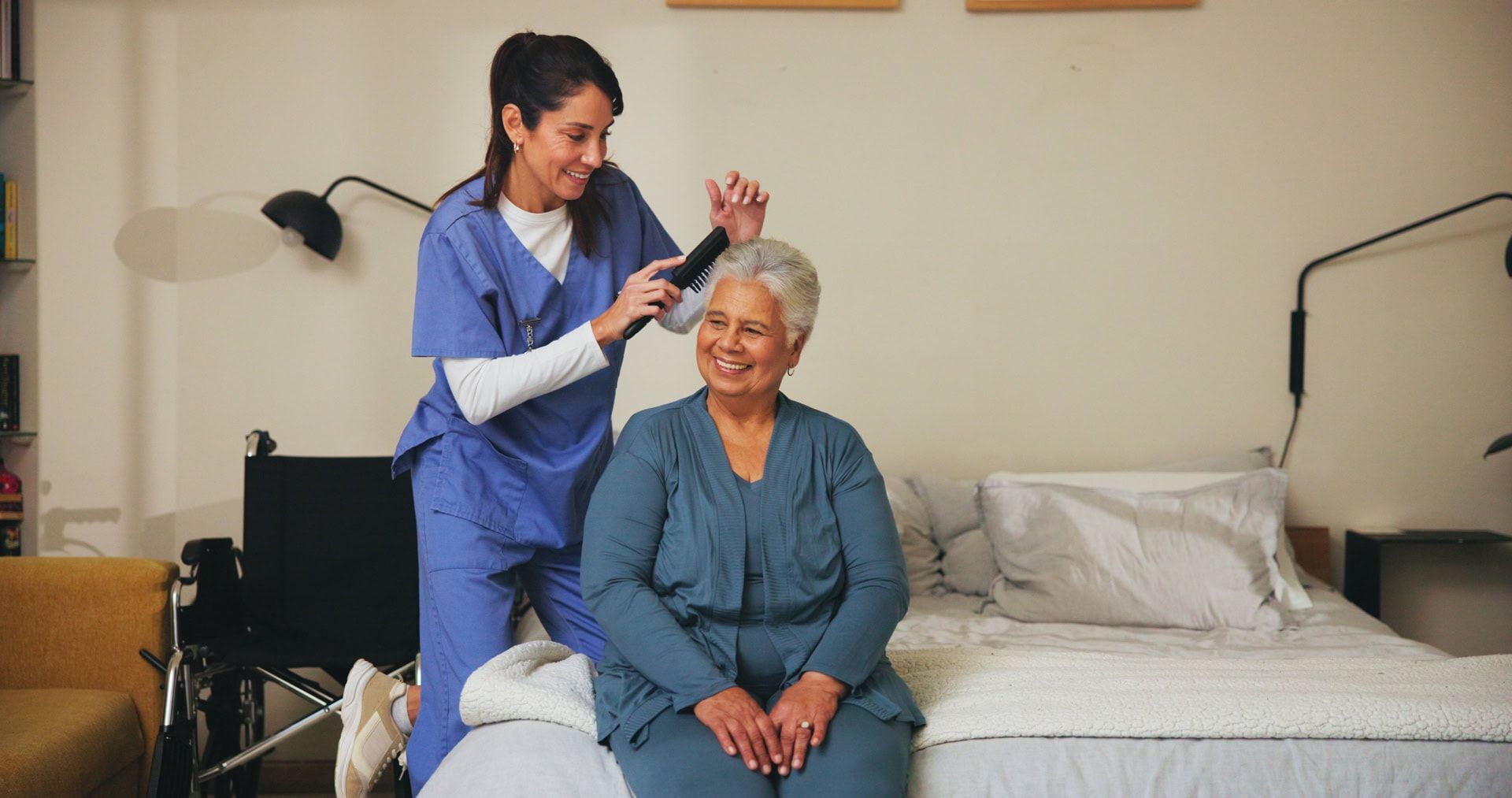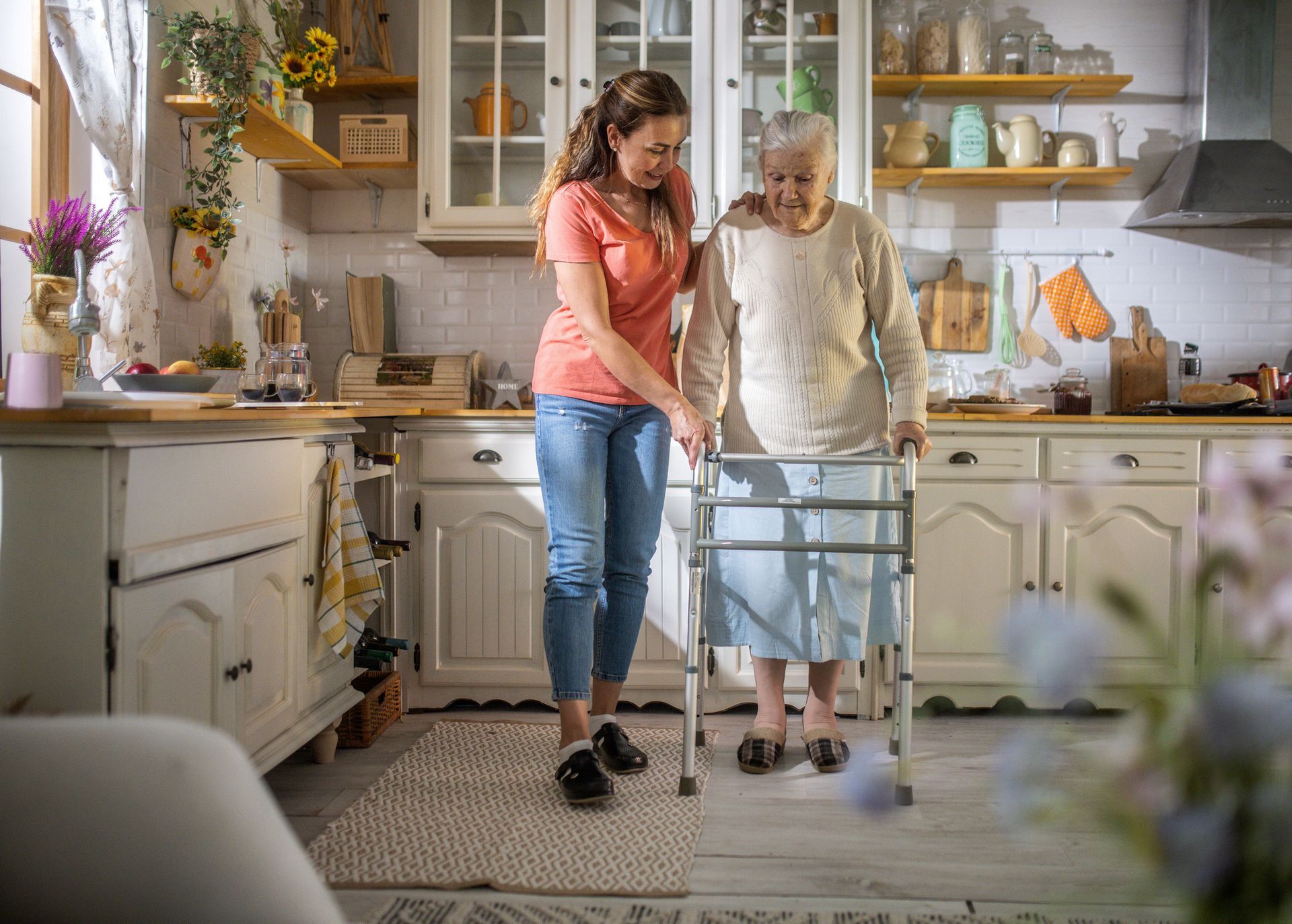Seniors in Home Care Services: Comprehensive Guide to In-Home Support and Assistance
As the population of adults aged 65 and older continues to grow rapidly, more families are discovering that seniors in home care services offer the perfect solution for maintaining independence while ensuring safety and comprehensive support. According to recent surveys, approximately 77% of adults aged 50 and older express a strong preference to age in place, remaining in their own homes rather than moving to institutional care facilities.
The concept of seniors in home care services encompasses a broad spectrum of supportive, health-related, and personal assistance services provided to older adults in their own residences. This approach enables seniors to live independently in familiar surroundings while receiving the professional care and assistance they need to maintain their quality of life, safety, and overall well-being. With the home care industry now representing a $113 billion market serving over 4.5 million people across the country, understanding your options for in-home senior care has never been more important.
This comprehensive guide will help you navigate the complex world of home care services, from understanding basic assistance to specialized medical care, ensuring you can make informed decisions for yourself or your loved ones. Whether you're exploring options for a parent, planning for your own future care needs, or seeking information to help others, this guide provides the essential knowledge you need to make informed choices about aging in place with professional support.

Understanding Seniors in Home Care Services
Seniors in home care services refers to professional care and support provided to older adults in their own homes, allowing them to age in place safely and comfortably. This approach represents a fundamental shift from traditional institutional care models, focusing instead on bringing qualified caregivers and health care professionals directly to the senior's residence. The philosophy behind this model recognizes that home is more than just a physical space—it's a repository of memories, independence, and personal identity that contributes significantly to overall well-being.
The growing demand for home-based care among adults aged 65 and older stems from several key factors that are reshaping how America approaches elder care. First, demographic changes have created an unprecedented aging population, with projections showing that older adults will outnumber children for the first time in US history by 2034. This demographic shift means that millions more families will need to make decisions about care arrangements for aging loved ones. Additionally, advances in medical technology now support more complex treatments in home settings, while cultural preferences increasingly favor maintaining independence and dignity in familiar surroundings.
Home care differs significantly from nursing homes or assisted living facilities in several important ways that affect both quality of life and practical considerations. While institutional care provides 24/7 supervision in a group setting with standardized schedules and shared spaces, home care offers personalized, one-on-one attention in the comfort of the person's own home. Seniors maintain control over their daily routines, can keep cherished possessions nearby, and continue living in neighborhoods where they have established relationships and memories. This autonomy and familiarity contribute to better emotional health and overall satisfaction with care arrangements.
The statistics supporting this trend are compelling and demonstrate why more families are choosing home care options. Recent data shows that home care can cost significantly less than institutional alternatives, with non-medical care ranging from $20 to $35 per hour compared to assisted living facilities averaging $4,500 per month and nursing homes costing approximately $8,000 monthly. This cost-effectiveness, combined with improved health outcomes and higher satisfaction rates, explains why professional home care services continue to experience rapid growth nationwide. The financial advantages become even more pronounced when considering that many seniors only need part-time assistance rather than 24-hour institutional care.
Essential Home Care Services for Seniors
The foundation of quality senior care lies in understanding the essential services that enable older adults to live safely and comfortably in their own homes. These core services address fundamental daily needs while promoting independence and maintaining dignity for seniors who prefer to age in place. By providing targeted support in specific areas, home care services allow seniors to maintain their autonomy while receiving help with tasks that have become challenging due to age-related changes or health conditions.
Personal care assistance forms the cornerstone of most home care plans, encompassing help with activities of daily living that many seniors find increasingly challenging as they age. Professional caregivers provide respectful assistance with bathing, grooming, dressing, and toileting, ensuring seniors maintain their personal hygiene and appearance with dignity intact. These intimate care tasks require trained professionals who understand how to balance providing necessary assistance while preserving the senior's sense of independence and self-respect. Medication management represents another critical component, with trained staff helping seniors organize medications, providing gentle reminders for dosing schedules, and monitoring for potential side effects or interactions that could indicate problems requiring medical attention.
Homemaking services complement personal care by maintaining a clean, safe, and comfortable living environment that supports independent living. These services typically include light housekeeping tasks such as dusting, vacuuming, and organizing living spaces to prevent clutter that could create fall hazards. Meal preparation ensures seniors receive proper nutrition through well-balanced, appetizing meals tailored to dietary restrictions and personal preferences, recognizing that many older adults struggle with cooking or lose interest in preparing food for themselves. Laundry service keeps clothing clean and organized, while grocery shopping assistance helps maintain household supplies and ensures seniors have access to their favorite foods and necessary household items.
Companionship and social engagement address one of the most significant challenges facing aging adults: social isolation and loneliness. Professional companions provide meaningful conversation, engage in activities the senior enjoys, and offer emotional support that enhances overall well-being beyond physical care needs. This human connection helps combat loneliness and depression while stimulating cognitive function through regular social interaction, games, shared activities, and engaging discussions. Many seniors living alone experience profound isolation that can negatively impact both mental and physical health, making companionship services a vital component of comprehensive home care.
Transportation services enable seniors to maintain their independence by providing safe, reliable travel to medical appointments, grocery stores, pharmacies, and social activities. Many seniors face mobility challenges or vision changes that make driving unsafe, and professional transportation ensures they can continue accessing essential services and maintaining social connections without burdening family members. This service proves especially valuable in areas with limited public transportation or for seniors who can no longer safely operate a vehicle but want to remain active in their communities.
Skilled nursing care represents the medical component of home care services, providing complex health care interventions for seniors with chronic conditions or recovering from illness or surgery. Licensed nurses can administer medications, manage wound care, monitor vital signs, and coordinate with physicians to ensure comprehensive medical oversight. This level of care often prevents unnecessary hospitalizations while allowing seniors to recover in the comfort of their own homes, surrounded by familiar belongings and without exposure to hospital-acquired infections.

Specialized Care Programs for Senior Conditions
Many seniors require specialized care programs designed to address specific health conditions and unique challenges associated with aging. These targeted services provide expert support for complex medical and cognitive needs while allowing seniors to remain safely in their own homes. Understanding the available specialized programs helps families match appropriate services to their loved one's specific circumstances, ensuring optimal care outcomes and quality of life.
Dementia and Alzheimer's care represents one of the most specialized areas of home care services, requiring caregivers with specific training in memory care techniques and behavioral management. Trained specialists understand the unique challenges associated with memory loss and cognitive decline, implementing personalized strategies to maintain safety while preserving dignity throughout the disease progression. These caregivers use proven techniques to reduce confusion and anxiety, establish consistent routines that provide comfort through predictability, and provide gentle guidance when seniors experience disorientation. Memory care specialists also support families by teaching communication strategies that minimize frustration and helping create safe, structured environments that reduce wandering risks while allowing maximum independence within appropriate boundaries.
Post-hospital recovery support and rehabilitation assistance help seniors transition safely from hospital to home while preventing readmissions that could lead to complications or increased healthcare costs. This specialized service includes monitoring vital signs, managing complex medication regimens prescribed during hospitalization, coordinating with healthcare teams to ensure continuity of care, and providing physical therapy assistance to help seniors regain strength and mobility. Recovery specialists understand the importance of following discharge instructions precisely while gradually helping seniors regain independence and strength in familiar surroundings where they feel most comfortable and motivated to heal.
Chronic disease management encompasses ongoing support for conditions such as diabetes, heart disease, COPD, and other long-term health challenges that require consistent monitoring and care. Specialized caregivers monitor symptoms, track vital signs regularly, assist with medication adherence to prevent complications, and recognize warning signs that require immediate medical attention. This proactive approach helps prevent complications and hospitalizations while ensuring seniors receive consistent, quality care that supports their long-term health goals and helps them maintain the best possible quality of life despite chronic health conditions.
Palliative and end-of-life care services focus on comfort, pain management, and emotional support for seniors facing terminal illnesses when curative treatments are no longer appropriate or desired. These compassionate programs prioritize quality of life over aggressive medical interventions, helping seniors and families navigate difficult decisions while maintaining dignity and peace during the final stages of life. Specialized teams often include nurses, social workers, and spiritual care providers who work together to address physical, emotional, and spiritual needs during this challenging time, ensuring the senior remains comfortable and surrounded by love.
Respite care provides temporary relief for family caregivers who need time to rest, attend to personal needs, or handle other responsibilities without worrying about their loved one's safety and care. Professional caregivers step in for hours, days, or even weeks, ensuring the senior receives consistent care while preventing caregiver burnout that could compromise the family's ability to provide ongoing support. This essential service recognizes that family members often serve as primary caregivers and need periodic support to maintain their own health and well-being, ultimately benefiting both the caregiver and the senior receiving care.

Benefits of Home Care for Seniors
The decision to choose home care services for seniors offers numerous advantages that extend far beyond basic assistance with daily activities. These benefits encompass physical, emotional, and financial considerations that make aging in place an attractive option for many older adults and their families. Understanding these advantages helps families make informed decisions about care arrangements that best serve their loved one's needs while respecting their preferences and maintaining quality of life.
Maintaining independence and dignity in familiar surroundings represents perhaps the most significant benefit of home care services from both emotional and psychological perspectives. Seniors can continue living in homes filled with memories, surrounded by cherished possessions and in neighborhoods where they have established relationships over decades. This continuity provides emotional stability and comfort during a time when many other aspects of life may be changing due to aging or health challenges. The ability to maintain one's daily routines, sleep in one's own bed, and keep beloved pets provides a sense of normalcy and control that institutional care simply cannot replicate.
Personalized care plans tailored to individual needs and preferences ensure that each senior receives exactly the level of support they require without unnecessary restrictions or standardized schedules. Unlike institutional care settings where schedules and services are standardized to accommodate multiple residents efficiently, home care allows for flexible arrangements that adapt to changing needs over time. Whether a senior requires minimal assistance with housekeeping or complex medical care, the service plan can be adjusted to provide appropriate support while promoting maximum independence. This individualized approach recognizes that every senior has unique needs, preferences, and circumstances that deserve personalized attention.
Cost-effectiveness compared to institutional care options makes home care an attractive choice for many families concerned about managing healthcare expenses over extended periods. With assisted living facilities averaging $4,500 per month and skilled nursing facilities costing approximately $8,000 monthly, home care services often provide significant savings while delivering superior one-on-one attention. Even seniors requiring extensive support may find that 24-hour home care costs less than institutional placement while offering personalized care from dedicated professionals. The financial advantages become particularly significant when considering that many seniors need only part-time assistance rather than round-the-clock institutional care.
Family involvement and emotional support from loved ones nearby creates a network of care that extends beyond professional services and contributes to better overall outcomes. Family members can visit regularly without institutional restrictions, participate actively in care decisions, and maintain meaningful relationships without the constraints often found in facility settings. This continued family engagement supports the senior's emotional well-being while providing peace of mind for relatives who want to remain actively involved in their loved one's care. The ability to share meals, celebrate holidays at home, and maintain family traditions proves invaluable for both seniors and their families.
Reduced risk of infections and hospital readmissions represents an important health benefit of home care services that can significantly impact both health outcomes and healthcare costs. Institutional settings often expose residents to infectious diseases due to close proximity to other individuals who may be ill, while home care eliminates this risk by providing care in a controlled, familiar environment. Additionally, personalized attention from dedicated caregivers can quickly identify health changes before they become serious enough to require hospitalization, enabling prompt intervention that prevents complications and emergency room visits.
The psychological benefits of remaining in a familiar environment cannot be overstated when considering overall well-being and quality of life for seniors. Seniors often experience less anxiety and depression when they can maintain their established routines and continue living in spaces where they feel secure and comfortable. This emotional stability supports better physical health outcomes and contributes to an overall higher quality of life, helping seniors maintain their sense of identity and purpose while receiving the support they need to age safely.
Choosing the Right Home Care Provider
Selecting the appropriate home care provider requires careful consideration of multiple factors to ensure your loved one receives quality, reliable care that meets their specific needs and respects their preferences. The process involves evaluating agencies, understanding credentials, and establishing clear expectations for the care relationship that will become an important part of your family's life. Taking time to make an informed decision pays dividends in peace of mind and quality care outcomes.
Key factors to consider when selecting a home care agency include licensing, insurance coverage, and accreditation status that demonstrate commitment to quality and professional standards. Verify that the agency holds all required state licenses and maintains appropriate insurance policies to protect both clients and caregivers in case of accidents or other unforeseen circumstances. Look for agencies accredited by recognized organizations such as the Joint Commission or the Community Health Accreditation Partner, as this indicates adherence to industry standards and commitment to quality improvement processes that benefit clients.
Essential questions to ask potential providers should cover staff qualifications, training programs, and supervision protocols to ensure caregivers have the skills and support needed to provide excellent care. Inquire about background checks, certification requirements, and ongoing education for caregivers to understand how the agency maintains high standards. Understanding how the agency handles emergencies, manages caregiver absences, and maintains communication with families helps assess their reliability and professionalism during challenging situations. Ask about their experience with specific conditions relevant to your loved one's needs and request references from current clients who can share their firsthand experiences with the agency's services.
The importance of care plan customization and regular assessments cannot be overlooked when choosing a provider who will become a trusted partner in your loved one's care. Quality agencies conduct comprehensive initial assessments to understand the senior's needs, preferences, and goals before beginning services. They should demonstrate flexibility in adjusting services as needs change over time and show willingness to involve family members in care planning decisions. Regular reassessments ensure the care plan remains appropriate and effective as the senior's condition evolves, whether improving or declining.
Understanding caregiver matching and backup support systems helps ensure consistent, compatible care that builds trust and comfort over time. Ask how the agency selects caregivers for specific clients, considering personality compatibility, relevant experience, and cultural factors that might affect the care relationship. Reliable agencies maintain adequate staffing levels to provide backup coverage when regular caregivers are unavailable due to illness or other commitments, preventing gaps in service that could compromise safety or comfort.
Evaluating costs, payment options, and insurance coverage requires understanding the agency's fee structure and billing practices to avoid surprises and ensure sustainable funding. Request detailed information about hourly rates, minimum service requirements, and any additional fees for holidays or last-minute scheduling changes. Understand which services may be covered by Medicare, Medicaid, or private insurance, and ask about private pay options and payment plans that might make services more affordable for families with limited resources.
The agency's reputation within the community and track record of service quality provide important insights into their reliability and commitment to client satisfaction. Check online reviews on multiple platforms, consult with healthcare professionals who work with the agency regularly, and contact your local Area Agency on Aging for recommendations from trusted sources. A reputable agency should be transparent about their services, responsive to questions, and willing to provide detailed information about their care approach and philosophy.

Getting Started with Home Care Services
Beginning the journey with home care services requires a systematic approach to assess needs, identify appropriate providers, and implement a care plan that supports the senior's goals for aging in place successfully. Understanding this process helps families navigate the transition smoothly while ensuring the best possible outcomes for their loved ones. Taking time to plan carefully at the beginning establishes a strong foundation for a positive, long-term care relationship.
The first step involves conducting a comprehensive assessment of care needs to determine appropriate service levels and identify specific areas where support would be most beneficial. This assessment should examine the senior's ability to perform activities of daily living, manage medications safely, maintain household tasks, and ensure personal safety in their home environment. Consider both current needs and anticipated changes that may occur due to aging or progressive health conditions. Healthcare professionals, such as physicians, nurses, or social workers, can provide valuable input during this assessment process, offering objective perspectives on care requirements.
Family members should evaluate the senior's home environment to identify any safety concerns or modifications needed to support aging in place effectively and prevent accidents. This might include installing grab bars in bathrooms, improving lighting throughout the home, removing trip hazards like loose rugs or electrical cords, or arranging furniture to accommodate mobility aids such as walkers or wheelchairs. The physical environment plays a crucial role in the success of home care services and the senior's ability to live independently with appropriate support.
Accessing services through various pathways depends on the senior's insurance coverage, financial situation, and specific care needs, with different funding sources available for different types of care. Medicare may cover skilled home health services for seniors who are homebound and require skilled nursing or therapy following hospitalization or acute illness. Medicaid programs in some states provide coverage for personal care services through waiver programs designed to help seniors avoid institutional placement. Veterans may qualify for benefits through the Department of Veterans Affairs, including Aid and Attendance benefits that can help pay for home care. Private insurance policies sometimes include home care benefits, though coverage varies significantly among plans and should be reviewed carefully.
The initial consultation and care plan development process typically begins with a detailed assessment conducted by the home care agency, usually at no cost to families. This meeting allows the agency to understand the senior's needs, preferences, and goals while explaining their services, care philosophy, and approach to client relationships. The resulting care plan should be comprehensive yet flexible, addressing immediate needs while planning for potential changes in the future as the senior's condition evolves.
Transition planning and family preparation for home care implementation involves coordinating schedules, establishing communication protocols, and preparing the senior psychologically for the arrival of professional caregivers in their home. Family members should discuss expectations with the senior, address any concerns about privacy or independence, and establish clear guidelines for caregiver responsibilities to prevent misunderstandings. Creating a welcoming environment and involving the senior in planning decisions helps ensure a positive start to the care relationship.
Resources for finding qualified home care providers in your area include several reliable sources that can help you identify reputable agencies serving your community. The Eldercare Locator, a public service of the U.S. Administration on Aging, provides information about local services and can be reached by calling 1-800-677-1116 or visiting their website. State and local Area Agencies on Aging offer referrals and information about licensed providers in the community, often maintaining lists of agencies they've vetted for quality and reliability.
Healthcare professionals, including physicians, social workers, hospital discharge planners, and case managers, often maintain lists of reputable agencies they recommend to patients and families based on feedback and outcomes. Online directories and review sites can provide additional information about local providers, though it's important to verify licensing and credentials independently through state regulatory agencies. Professional associations, such as the National Association for Home Care & Hospice, maintain member directories that can help identify agencies committed to industry standards and best practices.
The process of scheduling initial consultations with potential providers allows families to compare services, costs, and care philosophies before making a final decision. Most reputable agencies offer free consultations to assess needs and explain their services without obligation. This meeting provides an opportunity to ask questions, potentially meet caregivers who might be assigned to your loved one, and determine whether the agency's approach aligns with the senior's needs and family's expectations.
Financial planning for home care services should begin early in the process to ensure sustainable funding for ongoing care that may extend for months or years. Understanding insurance benefits, exploring private pay options, and investigating assistance programs helps families make informed decisions about affordable care options that won't deplete savings unexpectedly. Some agencies offer sliding scale fees or payment plans to make services more accessible to families with limited financial resources, so don't hesitate to ask about available options.
Creating emergency plans and backup arrangements ensures continuity of care when regular caregivers are unavailable due to illness or unexpected situations arise. Discuss how the agency handles emergencies, who to contact for urgent needs outside business hours, and what procedures are in place for severe weather or other disruptions to normal service delivery. Having these plans in place before they're needed provides peace of mind for both seniors and family members.
The implementation phase requires patience and flexibility as seniors adjust to receiving professional care in their homes and build relationships with caregivers. Regular communication between family members, caregivers, and agency staff helps identify any concerns early and make necessary adjustments to the care plan before small issues become significant problems. Most successful home care relationships develop gradually as trust builds and routines become established over the first few weeks of service.
Ongoing monitoring and evaluation ensure that home care services continue to meet the senior's evolving needs effectively throughout their care journey. Regular family meetings with the care team, periodic reassessments of the care plan, and open communication about satisfaction levels help maintain quality care while making adjustments as needed. This collaborative approach supports the ultimate goal of enabling seniors to age safely and comfortably in their own homes while maintaining the highest possible quality of life.
Conclusion
The journey of implementing seniors in home care services represents an investment in independence, dignity, and quality of life that benefits both older adults and their families in profound and lasting ways. By understanding the available options, carefully selecting providers, and actively participating in the care process, families can create supportive environments that enable their loved ones to thrive in the comfort and familiarity of their own homes.
With proper planning and the right team of professional caregivers, aging in place becomes not just a possibility, but a rewarding experience that honors the senior's preferences while providing the support they need to live safely and happily. The 77% of seniors who express a preference for aging at home can achieve this goal with appropriate support systems in place, maintaining their independence and dignity while receiving expert care tailored to their individual needs.
As our population continues to age and families increasingly seek alternatives to institutional care, home care services will play an ever more important role in supporting the health and well-being of older adults. Whether you're just beginning to explore options or ready to implement a care plan, remember that the goal is to enhance quality of life while respecting autonomy and personal preferences. With compassionate, professional home care services, seniors can continue enjoying the comfort of their own homes surrounded by the memories, possessions, and neighborhoods they love, supported by caregivers who genuinely care about their well-being and happiness.










